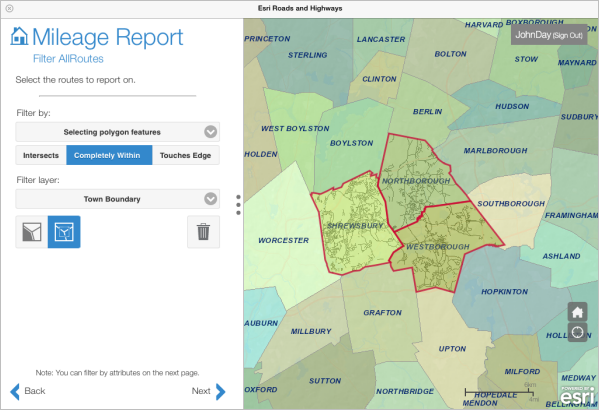What follows is a high-level overview of the collection of user interface components that allow you to access and execute Esri Roads and Highways functionality.
Editing toolbar
Roads and Highways for Desktop provides an editing toolbar in ArcGIS Desktop that supports LRS editing and related operations.

With it, you can perform the following operations on routes:
- Create routes.
- Extend routes.
- Retire routes or portions of routes.
- Reassign routes or portions of routes (sometimes referred to as splitting or merging routes).
- Realign routes.
- Reverse the calibration of routes.
- Calibrate routes.
You can also perform the following operations against centerlines that make up routes:
- Split a centerline at a click location.
- Split a centerline at a measure location.
- Merge centerlines.
- Delete centerlines.
In addition, you can change the time view of networks and events and identify LRS measure locations.
Catalog LRS management
Roads and Highways for Desktop is an extension to ArcGIS Desktop and the Catalog window allows you to manage and configure a Roads and Highways LRS. With it, you can:
- Configure an LRS.
- Create an LRS Network.
- Register event tables and feature classes with an LRS Network.
- Configure event measure behavior.
- Manage event and route shapes.
- Drag route and event layers into a map.
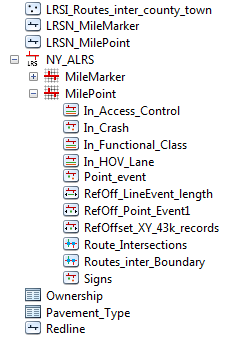
Geoprocessing tools
Roads and Highways supports geoprocessing tools to help with the management and data conversions of data in the LRS. It supports tools for the following:
- Appending events
- Calculating route concurrencies
- Converting PolylineM units of measures
- Converting a table to a CSV file
- Detecting event gaps on routes
- Detecting events with measures that aren’t on a route
- Detecting routes that are not monotonic (measures strictly increasing or decreasing)
- Detecting event overlaps on routes
- Generating events
- Generating routes
- Overlaying route events
- Relocating events
- Translating event measures from one LRM to another
- Updating calibration points
- Updating intersections
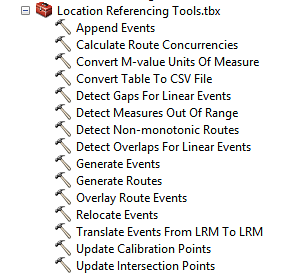
Roads and Highways for Linear Referencing capability
Roads and Highways for Server extends ArcGIS Server to enable map services with the Linear Referencing capability. This capability provides the ability to do the following:
- Edit events in a multilayer transactional manner.
- Translate coordinates to measures.
- Translate measures to coordinates.
- Translate measures from one LRM to another.
- Provide external event system measure updates resulting from LRS Network edits.
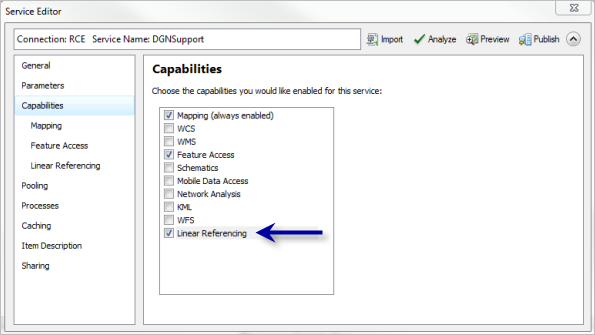
Event Editor
Event Editor is a web application delivered with Roads and Highways for Server that can be configured against event data published in Roads and Highways for Server with the Linear Referencing capability. It supports the following:
- Event data creation and editing
- Network and event data map navigation
- Route search
- Changing basemaps
- Splitting and merging events
- Identifying route measure locations
- Selecting events by route, attribute, geometry, and proximity
- Event quality control
- Route redlining
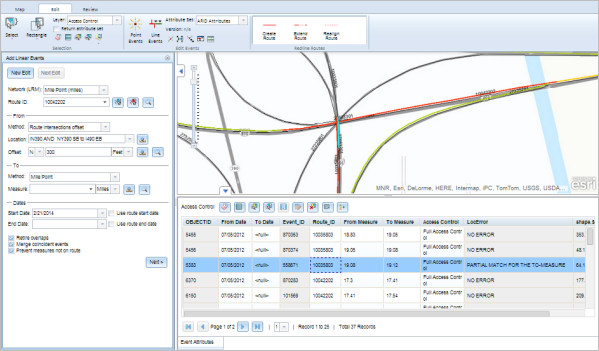
Roadway Reporter
Roadway Reporter is a web application powered by Roads and Highways for Server, which allows you to create mileage and road segment reports from a map-centric user experience. Roadway Reporter supports the following:
- Produce mileage reports.
- Produce segment reports.
- Export reports in either PDF or CSV formats.
- Save report configurations.
- Share report configurations.
- Modify report formats.
